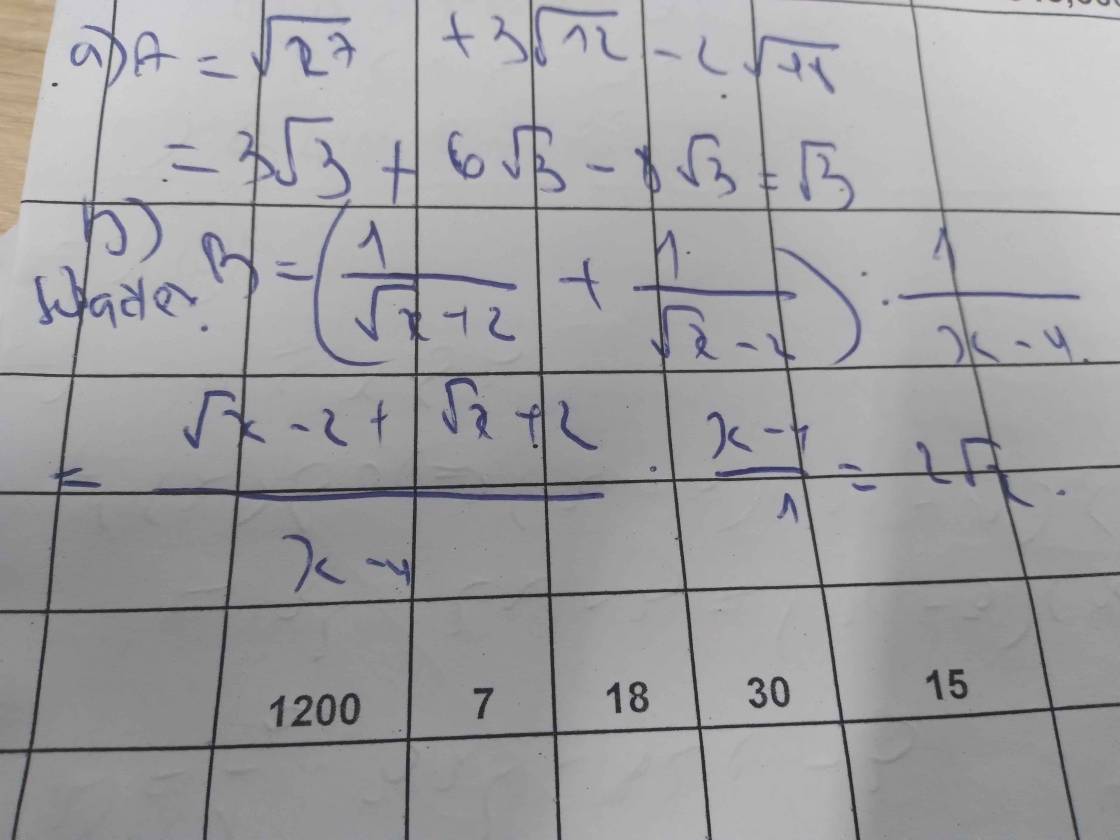Cho A= 1: (x+2 / x căn x -1 - căn x+1/x-1 + căn x+1/x+ căn x+1
a) rút gọn A
b) với x>0 và x+1 : chứng minh A >3
Hãy nhập câu hỏi của bạn vào đây, nếu là tài khoản VIP, bạn sẽ được ưu tiên trả lời.

\(A=\sqrt{x}+1\) (đã thu gọn)
\(B=\dfrac{4\sqrt{x}}{x+4}\) (đã thu gọn)
\(A=x-\sqrt{x}+1=\sqrt{x}\cdot\sqrt{x}-\sqrt{x}+1=\sqrt{x}\left(\sqrt{x}-1\right)+1\)
\(A=\dfrac{3}{2\sqrt{x}}\) (đã thu gọn)
\(A=\dfrac{3}{\sqrt{x}+3}\) (đã thu gọn)
\(A=1-\sqrt{x}\) (đã thu gọn)
\(A=x-2\sqrt{x}-1=\sqrt{x}\left(\sqrt{x}-2\right)-1\)

`a)->` ĐKXĐ : `x>=0;x\ne1`
`b)` Ta có :
`P=(\sqrtx)/(\sqrtx-1)-(2\sqrtx)/(\sqrtx+1)+(x-3)/(x-1)`
`P=(\sqrtx(\sqrtx+1)-2\sqrtx(\sqrtx-1)+x-3)/(x-1)`
`P=(x+\sqrtx-2x+2\sqrtx+x-3)/(x-1)`
`P=(3\sqrtx-3)/(x-1)`
`P=(3(\sqrtx-1))/((\sqrtx-1)(\sqrtx+1))`
`P=3/(\sqrtx+1)`
Vậy `P=3/(\sqrtx+1)` khi `x>=0;x\ne1`

a, \(A=\left(\frac{1}{1-\sqrt{x}}+\frac{1}{1+\sqrt{x}}\right):\left(\frac{1}{1-\sqrt{x}}-\frac{1}{1+\sqrt{x}}\right)+\frac{1}{1-\sqrt{x}}\)ĐK : \(x>0;x\ne1\)
\(=\left(\frac{1+\sqrt{x}+1-\sqrt{x}}{1-x}\right):\left(\frac{1+\sqrt{x}-1+\sqrt{x}}{1-x}\right)+\frac{1}{1-\sqrt{x}}\)
\(=\frac{2}{1-x}.\frac{1-x}{2\sqrt{x}}+\frac{1}{1-\sqrt{x}}=\frac{1}{\sqrt{x}}+\frac{1}{1-\sqrt{x}}=\frac{1-\sqrt{x}+\sqrt{x}}{-x+\sqrt{x}}=\frac{1}{\sqrt{x}-x}\)
b, Ta có : \(x=7+4\sqrt{3}=7+2.2\sqrt{3}=\left(\sqrt{4}+\sqrt{3}\right)^2\)
\(A=\frac{1}{\sqrt{4}+\sqrt{3}-7+4\sqrt{3}}\)

a: \(A=\left(\dfrac{1}{\sqrt{x}+1}-\dfrac{2\sqrt{x}-2}{x\sqrt{x}+x-\sqrt{x}-1}\right):\left(\dfrac{1}{\sqrt{x}-1}-\dfrac{2}{x-1}\right)\)
\(=\dfrac{x-1-2\sqrt{x}+2}{\left(\sqrt{x}+1\right)\left(x-1\right)}:\dfrac{\sqrt{x}+1-2}{x-1}\)
\(=\dfrac{x-2\sqrt{x}+1}{\left(\sqrt{x}+1\right)\left(x-1\right)}\cdot\dfrac{x-1}{\sqrt{x}-1}=\dfrac{\sqrt{x}-1}{\sqrt{x}+1}\)
b: Để A là số nguyên thì \(\sqrt{x}-1⋮\sqrt{x}+1\)
=>\(\sqrt{x}+1-2⋮\sqrt{x}+1\)
=>căn x+1 thuộc {1;2}
=>căn x thuộc {0;1}
mà x<>1
nên x=0

`A=(1/(x-sqrtx)+1/(sqrtx-1)):(sqrtx+1)/(sqrtx-1)^2`
`=((sqrtx+1)/(x-sqrtx)).(sqrtx-1)^2/(sqrtx+1)`
`=(sqrtx-1)^2/(x-sqrtx)`
`=(sqrtx-1)/sqrtx`
